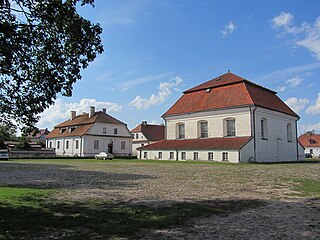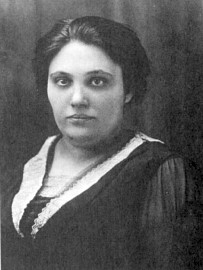Related Research Articles

Yiddish is a West Germanic language historically spoken by Ashkenazi Jews. It originated during the 9th century in Central Europe, providing the nascent Ashkenazi community with a High German-based vernacular fused with many elements taken from Hebrew and to some extent Aramaic; most varieties also have substantial influence from Slavic languages, and the vocabulary contains traces of influence from Romance languages. Yiddish writing uses the Hebrew alphabet. In the 1990s, there were around 1.5–2 million speakers of Yiddish, mostly Hasidic and Haredi Jews. In 2012, the Center for Applied Linguistics estimated the number of speakers to have had a worldwide peak at 11 million, with the number of speakers in the United States and Canada then totaling 150,000. An estimate from Rutgers University gives 250,000 American speakers, 250,000 Israeli speakers, and 100,000 in the rest of the world.

Sarah Aaronsohn was a member of Nili, a ring of Jewish spies working for the British in World War I, and a sister of agronomist Aaron Aaronsohn. She is often referred to as the "heroine of Nili."

A shtetl or shtetel was a small town with a large Ashkenazi Jewish population which existed in Central and Eastern Europe before the Holocaust. Shtetls were mainly found in the areas that constituted the 19th-century Pale of Settlement in the Russian Empire as well as in Congress Poland, Austrian Galicia, Romania and Hungary.
Uriel Weinreich was a Polish-American linguist.

The Tseno Ureno, also spelt Tsene-rene, Tz'enah Ur'enah, sometimes called the Women's Bible, is a Yiddish-language prose work of c.1590s whose structure parallels the weekly Torah portions and Haftarahs used in Jewish prayer services. The book was written by Jacob ben Isaac Ashkenazi (1550–1625) of Janów Lubelski, and mixes Biblical passages with teachings from Judaism's Oral Torah such as the Talmud's Aggadah and Midrash, which are sometimes called "parables, allegories, short stories, anecdotes, legends, and admonitions" by secular writers.

Tkhines or teḥinot may refer to Yiddish prayers and devotions, usually personal and from a female viewpoint, or collections of such prayers. They were written for Ashkenazi Jewish women who, unlike the men of the time, typically could not read Hebrew, the language of the established synagogue prayer book. They were most popular from the 1600s to the early 1800s, with the first major collection of tkhines, the Seyder Tkhines, being printed in 1648. Unlike Hebrew prayers, tkhines dealt with issues specific to women. Despite being for women, it is thought that many tkhines were written by men and the authorship of most tkhines is often difficult to establish, due to multiple publications of the same tkhine and the use of pseudonyms.

Yiddish literature encompasses all those belles-lettres written in Yiddish, the language of Ashkenazic Jewry which is related to Middle High German. The history of Yiddish, with its roots in central Europe and locus for centuries in Eastern Europe, is evident in its literature.
Shiksa is an often disparaging term for a non-Jewish woman or girl. The word, which is of Yiddish origin, has moved into English usage, mostly in North American Jewish culture.

DavidBergelson was a Yiddish language writer born in the Russian Empire. He lived for a time in Berlin, Germany before moving to the Soviet Union following the Nazi rise to power in Germany. He was a victim of the post-war antisemitic "rootless cosmopolitan" campaign and one of those executed on the Night of the Murdered Poets.

Yiddish dialects are variants of the Yiddish language and are divided according to the region in Europe where each developed its distinctiveness. Linguistically, Yiddish should be divided in distinct Eastern and Western dialects. From Eastern Yiddish, Northeastern dialects were dominant in 20th-century Yiddish culture and academia, while Southern dialects of Yiddish are now the most commonly spoken, preserved by many Hasidic communities.

Zwi Migdal was an organized-crime group by Polish Jewish individuals, founded in Poland and based mainly in Argentina, that trafficked in Jewish women from Central Europe for sexual slavery and forced prostitution.
Sarah Rebecca Rachel Leah Horowitz (1715–1795), known as Leah Horowitz, was a rabbinic and kabbalistic scholar, who wrote in Yiddish. She was the author of Tkhinne imohes. She lived in Bolechów, Poland.

Dovid Katz is an American-born, Vilnius-based scholar, author and educator, specializing in Yiddish language and literature, Lithuanian Jewish culture, and the Holocaust in Eastern Europe. In recent years, he has been known for combating the so-called "Double Genocide" revision of Holocaust history which asserts a moral equivalence between Nazi Germany and the Soviet Union. He is editor of the web journal Defending History which he founded in 2009. He is known to spend part of each year at his home in North Wales. His website includes a list of his books, of some articles by topic, a record of recent work, and a more comprehensive bibliography.

Esther Frumkin was a leader of the Yiddish socialist General Jewish Labour Bund in Lithuania, Poland and Russia, and later of the Yevsektsiya in the Soviet Union. An ardent proponent of the Yiddish language, her political position on Jewish assimilation satisfied neither traditional Jews nor the Soviet leaders.

Yente Serdatzky was a Russian-born American Yiddish-language writer of short fiction and plays, active in New York City.

Devorah Baron was a pioneering Jewish writer, noted for writing in Modern Hebrew and for making a career as a Hebrew author. She has been called the "first Modern Hebrew woman writer". She wrote about 80 short stories, plus a novella titled Exiles. Additionally, she translated stories into Modern Hebrew.

A firzogerin,, alternately vorsangerin, foreleiner, zugerin, or zugerke, was a historic role in the synagogue for a learned Jewish woman leading women in prayer from the weibershul as a precentress, parallel to the main service led by a male chazzan.
Sarah Reisen was a Belarusian-American Yiddish poet and translator.

Vaybertaytsh or mashket, is a semi-cursive script typeface for the Yiddish alphabet. From the 16th until the early 19th century, the mashket font distinguished Yiddish publications, whereas Hebrew square script were used for classical texts in Hebrew and Aramaic, and "Rashi" script for rabbinic commentaries and works in Ladino.
Yehudis (Yudis) Tsik (1898–1988), better known by her pen name Yudika, was a Canadian Yiddish poet whose work was published around the world.
References
- 1 2 3 4 Liptzin, Sol, A History of Yiddish Literature, Jonathan David Publishers, Middle Village, NY, 1972. ISBN 0-8246-0124-6. pp.16-17.
- ↑ Katz, Dovid (2007). Words on Fire: The Unfinished Story of Yiddish (2 ed.). New York: Basic Books. p. 95. ISBN 978-0-465-03730-8.
- ↑ "Sarah Bas Tovim". Jewish Women's Archive . Retrieved 2021-11-01.